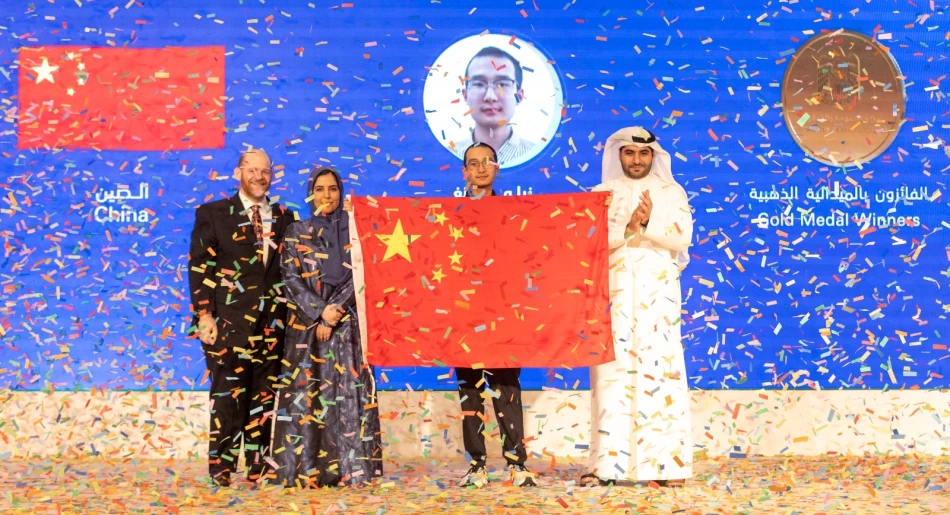
China Dominates Chemistry Olympiad as Iraq Secures Historic Gold Medal
UAE Sets New Standard for Global Academic Excellence with Record-Breaking Chemistry Olympiad
The United Arab Emirates has successfully concluded the largest International Chemistry Olympiad in the competition's 57-year history, hosting over 360 students from more than 90 countries. The event showcased the UAE's growing influence as a global education hub while reinforcing its strategy to position itself at the forefront of international scientific collaboration and youth development.
Historic Participation Numbers Signal Growing Global Interest
The 57th International Chemistry Olympiad marked a watershed moment for the competition, which began in 1968. The unprecedented participation of 360+ students represents a significant increase from previous years, reflecting both the UAE's organizational capabilities and the growing global emphasis on STEM education excellence.
Chinese students dominated the top positions, with Xian Du from the People's Republic of China claiming first place, followed by Václav Verner from the Czech Republic in second, and Ribo Song, also from China, in third. The medal distribution included 30 gold medals, 73 silver medals, and 107 bronze medals, with an additional 30 participants receiving certificates of appreciation.
Strategic Investment in Educational Infrastructure Pays Off
The UAE's ability to simultaneously conduct practical examinations for all participants demonstrates the country's substantial investment in educational infrastructure. This logistical achievement required over 10,000 hours of preparatory work and involved 120 researchers from the United Arab Emirates University, supported by an international scientific committee of 23 experts from 12 countries.
Comparison with Global Education Hubs
This organizational success places the UAE alongside established education centers like Singapore and Switzerland, which have similarly leveraged international academic competitions to enhance their global education credentials. Unlike these traditional hubs, however, the UAE's approach integrates cultural exchange with academic excellence, offering participants a comprehensive 10-day program combining rigorous testing with cultural immersion.
Economic and Diplomatic Implications
Education Minister Sarah Al Amiri emphasized that hosting such events aligns with the UAE's developmental vision, which positions future generations as fundamental pillars of national growth. This strategy mirrors Singapore's approach to becoming a regional education hub, but with the added advantage of the UAE's strategic location bridging East and West.
The economic implications extend beyond immediate tourism revenue. By establishing itself as a premier destination for international academic competitions, the UAE is building long-term relationships with global educational institutions and positioning itself as a preferred location for international students and researchers.
Building National Scientific Capacity
The UAE's four-member national team underwent intensive preparation, including specialized workshops and training camps both domestically and internationally, notably at the Sirius Center in Russia. This comprehensive approach to talent development reflects the country's broader strategy of building indigenous scientific capabilities rather than relying solely on imported expertise.
Continuity of Excellence
This Chemistry Olympiad success builds on the UAE's previous hosting achievements, including the Junior Science Olympiad (2021) and the International Biology Olympiad (2023). This pattern suggests a deliberate strategy to establish the UAE as a regular host for major international academic competitions, potentially creating a sustainable competitive advantage in the global education market.
Future Implications for Regional Competition
As Uzbekistan prepares to host the next Chemistry Olympiad, the UAE has set a high benchmark for organizational excellence and participant experience. The handover to Uzbekistan also signals the growing importance of Central Asian countries in international academic competitions, potentially shifting some focus from traditional European hosts.
The UAE's success in hosting this record-breaking event demonstrates how strategic investment in education infrastructure can yield significant diplomatic and economic returns. By combining academic rigor with cultural exchange, the UAE has created a model that other aspiring education hubs will likely attempt to replicate, though few possess the UAE's unique combination of financial resources, strategic location, and government commitment to educational excellence.
Most Viewed News

 Sara Khaled
Sara Khaled






